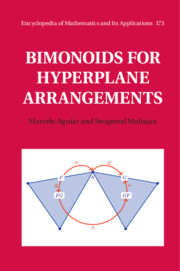Book contents
- Frontmatter
- Contents
- Preface
- Introduction
- Part I Species and operads
- Part II Basic theory of bimonoids
- Part III Structure theory for bimonoids
- Chapter 13 Loday–Ronco, Leray–Samelson, Borel–Hopf
- Chapter 14 Hoffman–Newman–Radford
- Chapter 15 Freeness under Hadamard products
- Chapter 16 Lie monoids
- Chapter 17 Poincaré–Birkhoff–Witt and Cartier–Milnor–Moore
- Appendices
- References
- List of Notations
- List of Tables
- Author Index
- Subject Index
Chapter 17 - Poincaré–Birkhoff–Witt and Cartier–Milnor–Moore
from Part III - Structure theory for bimonoids
Published online by Cambridge University Press: 28 February 2020
- Frontmatter
- Contents
- Preface
- Introduction
- Part I Species and operads
- Part II Basic theory of bimonoids
- Part III Structure theory for bimonoids
- Chapter 13 Loday–Ronco, Leray–Samelson, Borel–Hopf
- Chapter 14 Hoffman–Newman–Radford
- Chapter 15 Freeness under Hadamard products
- Chapter 16 Lie monoids
- Chapter 17 Poincaré–Birkhoff–Witt and Cartier–Milnor–Moore
- Appendices
- References
- List of Notations
- List of Tables
- Author Index
- Subject Index
Summary
This chapter establishes the Poincaré-Birkhoff-Witt and Cartier-Milnor-Moore theorems for Lie monoids in species (relative to a fixed hyperplane arrangement). The Poincaré-Birkhoff-Witt theorem (PBW) says that for any Lie monoid, its universal enveloping monoid is isomorphic to the cofree cocommutative comonoid on its underlying species. The isomorphism is that of comonoids. It depends on the choice of a noncommutative zeta function. Equivalently, for any Lie monoid, PBW defines an idempotent operator on the free bimonoid of its underlying species whose image is the cofree cocommutative comonoid and coimage is the universal enveloping monoid. We call this the Solomon operator. We give two proofs of PBW. The first one is elementary and inductively builds the Solomon operator. The second one starts with an explicit definition of the Solomon operator, and then establishes that it has the correct image and coimage. The Cartier-Milnor-Moore theorem (CMM) says that the universal enveloping and primitive part functors determine an adjoint equivalence between the category of Lie monoids and the category of cocommutative bimonoids. It is a formal consequence of Borel-Hopf and PBW.PBW and CMM also have dual versions. They go along with the Borel-Hopf theorem for commutative bimonoids. Relevant notions are Lie comonoids and their universal coenveloping comonoids. PBW and CMM as well as their dual versions have signed analogues.
Keywords
- Type
- Chapter
- Information
- Bimonoids for Hyperplane Arrangements , pp. 678 - 716Publisher: Cambridge University PressPrint publication year: 2020

